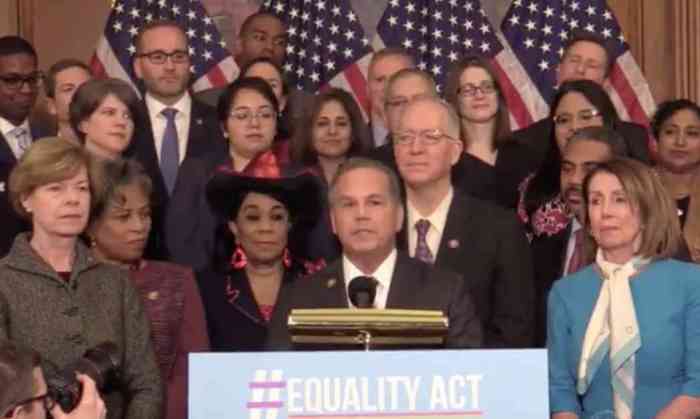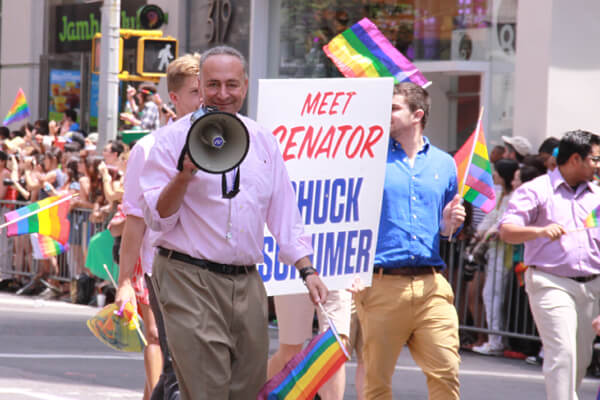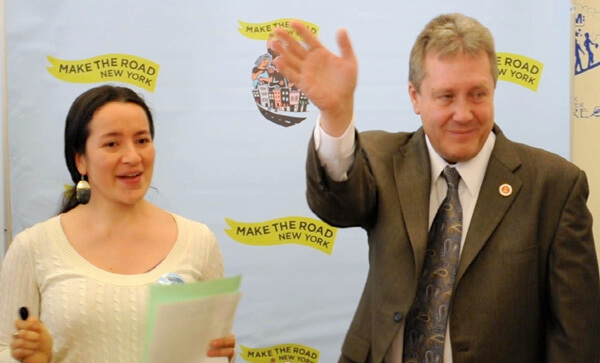Senator Kirsten Gillibrand with Congressman Jerrold Nadler at an LGBT community forum at GMHC on October 21. | GAY CITY NEWS
Sixteen days shy of the November 6 election, when she is seeking her first full six-year term in the Senate, Democratic Senator Kristen Gillibrand spent roughly 90 minutes meeting with leaders of the LGBT and AIDS communities to discuss key priorities for next year and beyond.
Gillibrand, appointed by former Governor David Paterson after Hillary Clinton resigned her Senate seat in early 2009 to become secretary of state, was joined by three fellow Democrats — West Side Congressman Jerrold Nadler, out lesbian City Council Speaker Christine Quinn, and Chelsea Assemblyman Dick Gottfried — in an October 21 gathering of roughly 100 held at the Gay Men’s Health Crisis offices on West 33rd Street.
Quinn, in introducing the senator, recalled that when the two spoke on the eve of Paterson’s appointment of her, Gillibrand pledged to be “the most-LGBT supportive senator” in Washington. Noting the challenge of delivering on that promise with stalwart advocates like Ted Kennedy in the Senaate, Quinn declared that Gillibrand “got the job done.”
The speaker noted that she played a key role in convincing Senate Armed Services Chairman Carl Levin to hold hearings on Don’t Ask, Don’t Tell, where, in February 2010, Defense Secretary Robert Gates and Joint Chiefs of Staff Chairman Michael Mullen first stated publicly that it was time to repeal the anti-gay policy. Quinn also praised the senator’s work on behalf of women’s right to choose and their access to affordable contraceptives.
Gillibrand focused much of her remarks on the Respect for Marriage Act, championed by Nadler, that would repeal the Defense of Marriage Act (DOMA) and also ensure that even if a gay or lesbian couple’s home state did not recognize their marriage, the federal government would as long as they married in a state where it was legal.
“This bill takes care of it all,” Gillibrand said, at least until such time as the Supreme Court rules that all gay and lesbian couples nationwide have the right to marry under the US Constitution.
Asked how she handicapped the Supreme Court’s handling of DOMA, if as expected it takes up the 1996 law this term in the wake of two federal appeals courts striking it down, she said that Chief Justice John Roberts’ vote this past spring to uphold the Obama health care law showed “he can work outside the right-wing majority.” She said that Justice Anthony Kennedy, a critical vote in overturning the nation’s sodomy laws in 2003 as well as an anti-gay Colorado initiative in 1996, also presented an “interesting” opportunity to win on DOMA.
On AIDS issues, Gillibrand said she supports federal funding of needle exchange programs to combat new infections, backs an effort by California Democratic Congresswoman Barbara Lee to combat the rising tide of HIV criminalization statutes across the country, and will fight hard to ensure that AIDS funding is held harmless in the event that Congress fails to act by year-end to forestall draconian cuts mandated across the board by last year’s budget agreement.
Asked about a “Robin Hood” tax on financial transactions on Wall Street, she voiced concern that it could have “unintended consequences” by incentivizing major players to seek profit in playing off the market price differential between transactions taxed here in the US and identical transactions entered into outside the country — so-called regulatory arbitrage. Gillibrand pledged to examine any proposal for such a tax put forward.
Gillibrand easily won a November 2010 election to fill out the final two years of Clinton’s Senate term and is expected to have no trouble prevailing over Wendy Long, a far-right candidate nominated by the Republicans.




































